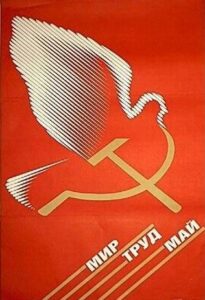 In 1917, the Russian people, especially the working class, took control of society and history. The October Revolution delivered Peace, Bread and Land by ending the slaughter of the Russian soldiers, cutting the working day to eight hours and distributing the feudal estates to the peasants. The new government introduced sweeping democratic gains for women, LGBT people and the national minorities oppressed in the dictatorship of the Tsarist empire. In spite of invasions by most capitalist countries, including Canada, the revolution also led to a flowering of art, science and culture and action to protect the environment.
In 1917, the Russian people, especially the working class, took control of society and history. The October Revolution delivered Peace, Bread and Land by ending the slaughter of the Russian soldiers, cutting the working day to eight hours and distributing the feudal estates to the peasants. The new government introduced sweeping democratic gains for women, LGBT people and the national minorities oppressed in the dictatorship of the Tsarist empire. In spite of invasions by most capitalist countries, including Canada, the revolution also led to a flowering of art, science and culture and action to protect the environment.
This will not be the dominant story in the news and other media over the hundredth anniversary. Rather there will be an avalanche of distortions. The ruling class does not want people to know that in 1917 the majority of people took control of the country they lived in for the first time in history.
Most of the time, decisions about society, politics and economics are taken by a tiny minority: the ruling class and their representatives. Occasionally, pressure from the majority of society forces changes, but still the elite seek to rule as they have done before.
Revolutions happen when the majority of the population have exhausted other forms of struggle to change their world for the better. There is an element of celebration in a revolution as people sense their freedom and power. There is also serious struggle and enormous sacrifices.
Revolutions and counter-revolutions dominated the first part of the twentieth century. After World War II there were still mass struggles and revolutionary explosions, although in the advanced capitalist countries the long post-war boom gave rise to a period of relative stability. With the collapse of Stalinism, the capitalist class imagined that the future would always be capitalist and so claimed the end of history. This triumphant mood and the domination of neo-liberalism boosted the capitalists and have been the major trends of the last 30 years. During this time, the workers’ organizations and political understanding were pushed back.
However, the world is changing again. The capitalist class is not confident about the future; they look ahead with fear and worry. They know there is a rising tide of anger in society – anger at massive inequality, widespread poverty, lousy jobs, environmental destruction, ongoing discrimination and all the other ills of capitalism.
Almost everywhere, the capitalist political parties and institutions are in crisis. Society is more and more polarized. Revolutions and counter-revolutions will be back on the agenda. Socialism is gaining ground as people seek an answer to the failings of the present world.
Faced with the challenges to their rule, the capitalist class and their paid academics and commentators will pour forth lies about the Russian Revolution. They will seek to bury its inspiring history and record, hoping to discourage activists and young people from learning about the revolution and its relevance for today.
Later the revolution was betrayed by Stalinism, with many of the gains lost and democracy crushed. Eventually the economic system collapsed due to failures of the bureaucracy. However, Stalinism was not the inevitable outcome of the Russian Revolution. It took a one-sided civil war to crush the revolutionary democracy, with a river of blood between the Russian Revolution and the Stalinist reaction. The most prominent victims of Stalin’s purges were those who defended workers’ democracy and international solidarity – people who came to be called Trotskyists.
Throughout 2017, Socialist Alternative will publish in our magazine and on our website articles about the Revolution, its achievements, the impact it had in Canada and around the world, and its relevance for today.
Revolutions this century will not be a re-run of Russia 1917. However, there are important lessons including the decisive role that a revolutionary party, the Bolsheviks, and its leadership had in ensuring that reaction did not crush the revolution as happened so many other times. The twenty-first century will see opportunities for new revolutions that break the chains of capitalism.



